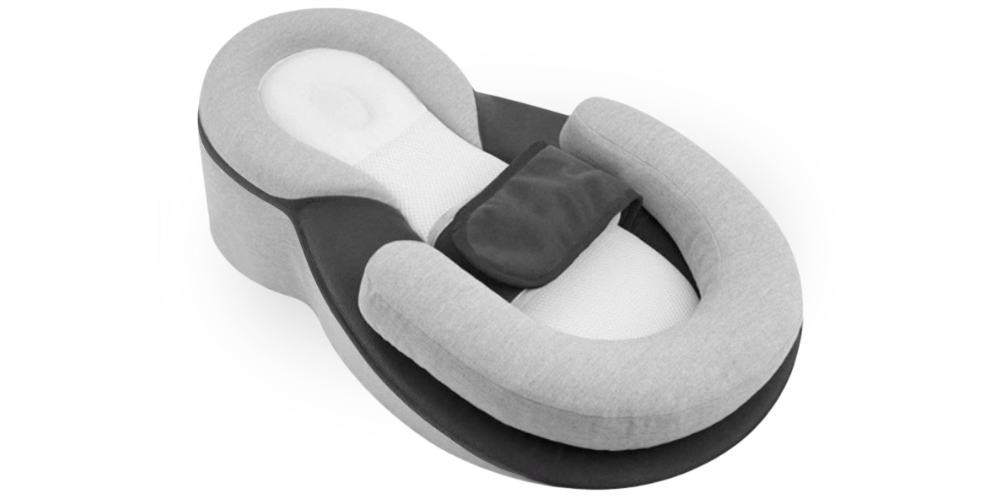It’s 2 a.m. again.
Your baby just finished feeding, you finally got them to sleep… and within minutes, they’re crying, wriggling, and spitting up. The nights feel endless — and you start to wonder: Why does reflux always seem so much worse after dark?
If you’ve ever rocked your baby in the glow of a night lamp, exhausted and near tears, you’re far from alone. Let’s break down why reflux often flares up at night and how you can make sleep safer and calmer for both you and your baby.
Note: This article is for educational purposes only and should never replace medical advice.
Why Reflux Feels Worse at Night
During the day, babies spend a lot of time upright — being fed, burped, or held. Gravity helps keep milk in the stomach.
At night, though, babies lie flat for longer periods, which means that milk (and acid) can more easily flow back into the esophagus.
There are three key reasons it feels worse:
1. Gravity disappears.
When lying flat, gravity can’t help digestion. Milk stays closer to the throat, which can cause coughing or discomfort.
2. Digestion slows down.
At night, your baby’s whole system — including digestion — moves at a slower pace. That means milk can sit in the stomach longer.
3. Overtiredness amplifies discomfort.
When babies are exhausted, they’re more sensitive to any discomfort. Even small reflux sensations can trigger crying and wake-ups.
So no, you’re not imagining it — reflux really does feel worse at night. But there are ways to make it better.
Nighttime Habits That Can Make Reflux Worse
Sometimes, simple evening routines unknowingly make reflux flare up. Here are a few to watch out for:
-
Feeding right before laying baby flat
-
Tight swaddles or sleep sacks pressing on the tummy
-
Overfeeding before bedtime (“tanking up”)
-
Rocking or bouncing too soon after feeding
-
Overheated sleep environments
Being mindful of these small details can make a surprising difference.
What You Can Safely Do to Help
Here are a few gentle, expert-backed adjustments that can bring relief tonight:
1. Hold your baby upright after the last feed.
Keep your baby upright for at least 20–30 minutes before bedtime to allow digestion to start.
2. Create a calm, dark, cool environment.
Warm rooms and overstimulation make babies fussier and digestion slower. A quiet, low-light setting helps soothe both of you.
3. Avoid laying flat immediately.
If possible, transition your baby gradually from upright holding to a safe, slightly inclined sleep position.
4. Use a safe, ergonomic sleep solution.
The DreamNest™, designed by pediatric osteopaths, helps babies rest at a pediatric-recommended 15° incline — supporting digestion, reducing reflux discomfort, and preventing rolling with secure anti-roll edges.
The breathable materials prevent overheating, helping your baby sleep more deeply and safely.
👉 Try DreamNest™ 100% risk-free for 90 nights — and discover how calm nights can actually feel.
Why Safe Incline (and Not Sitting) Matters
Some parents try to have their baby sleep upright in a car seat or swing, thinking it helps reflux. Unfortunately, these positions can actually make things worse — they compress the belly and tilt the neck forward, which may restrict breathing.
A gentle incline while lying flat is the safest and most effective middle ground.
It lets gravity support digestion without putting pressure on the baby’s airways. That’s exactly why pediatric osteopaths designed DreamNest™ — to merge comfort with safety.
Gentle Evening Routine for Reflux Babies
Here’s a simple nighttime flow you can start tonight:
-
Feed in a calm environment. No TV, bright lights, or noise.
-
Burp halfway and at the end of the feed.
-
Hold upright for 20–30 minutes. Gentle cuddles or slow walking help.
-
Keep baby slightly inclined and secure once asleep.
-
Ensure room is cool (19–21°C / 66–70°F) and bedding is breathable.
-
Stay calm — babies sense your tension.
Consistency is key. It might not fix everything overnight, but over time, these small tweaks can completely transform your nights.
When to Talk to Your Pediatrician
Night reflux is usually harmless, but it’s worth checking in with your pediatrician if:
-
Your baby spits up large volumes or vomits forcefully
-
You see blood or green/yellow fluid
-
Your baby refuses to feed or arches in pain every time
-
You hear choking or persistent coughing at night
-
Your baby isn’t gaining weight as expected
Your doctor can rule out underlying issues or adjust feeding routines if needed.
FAQs
Why is reflux worse at night?
Because babies lie flat for longer, gravity can’t keep milk down, and digestion slows.
Should I let my baby sleep upright in a car seat?
No — it’s not safe for long sleep periods. Always use flat, firm sleep surfaces.
Can I elevate my baby’s mattress?
Only with a safety-tested ergonomic incline bed like DreamNest™. Never wedge objects under a mattress.
What’s the best way to soothe reflux at night?
Keep baby upright after feeding, maintain a calm routine, and ensure safe, slightly inclined sleep.
When should I worry?
If your baby seems in pain, vomits forcefully, or struggles to breathe, seek medical advice right away.
Conclusion: Calm Nights Are Possible
Reflux doesn’t have to steal your nights.
By understanding what’s happening in your baby’s little body — and creating a sleep setup that supports digestion and comfort — you can both finally rest easier.
You’re not doing anything wrong. You’re doing your best, and your baby feels it. 🌙



